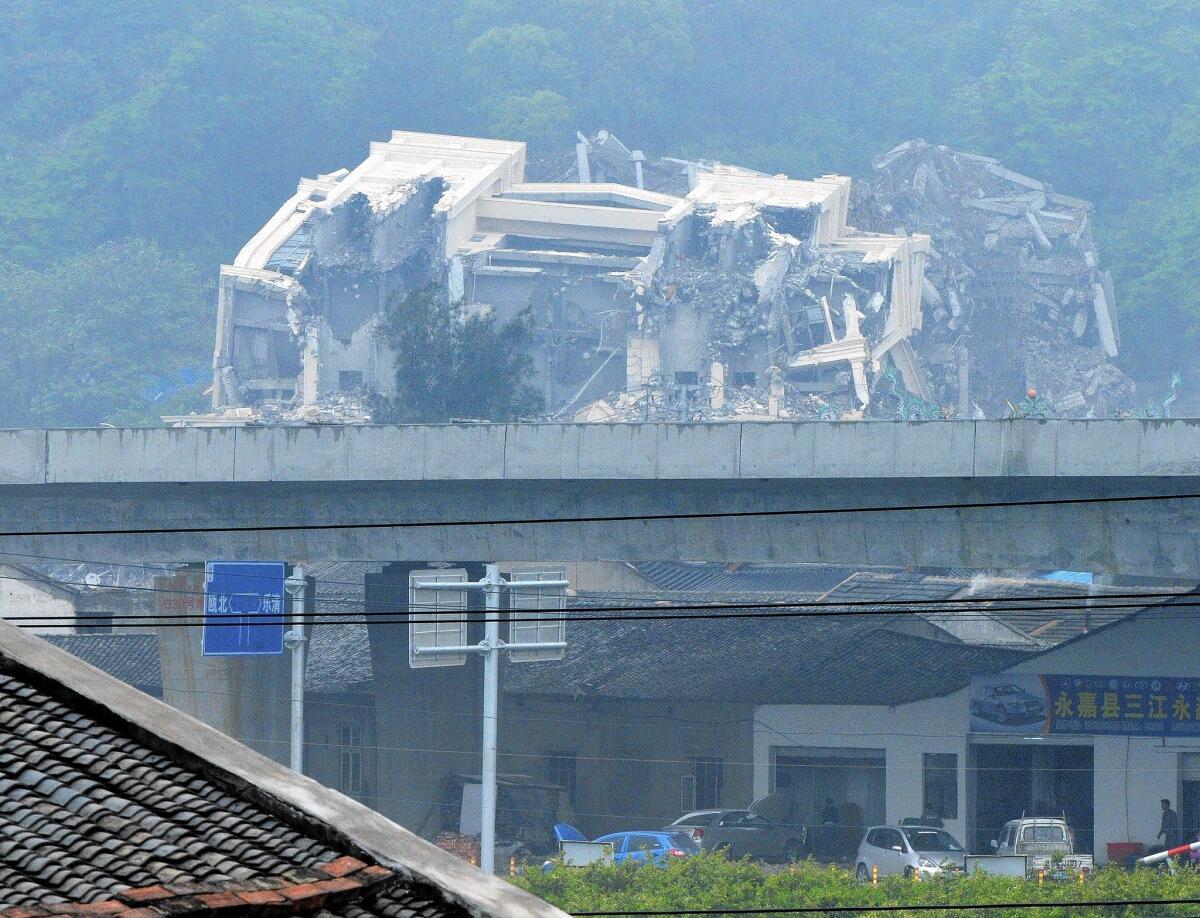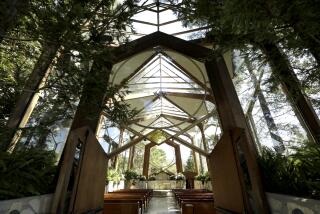China demolition of church in Wenzhou leaves Christians uneasy

Reporting from Wenzhou, China — Purple and yellow petunias greeted the faithful ascending the steps of the Flowered Plain village church on Sunday, its graceful gray domes a shade darker than the overcast sky. Inside, men sat in the pews on the right, as is customary here, while women, some toting grandsons and granddaughters, occupied the left and center.
Video projectors prompted congregants to a hymn, “Tread Softly.” They rose, filling the sanctuary with their voices. “Be silent, be silent! A whisper is heard.... Tread softly, tread softly! My Lord is here.”
If quiet reserve was one message of the morning, unity was another. When it came time for the sermon, lay pastor Ye Sen did not refer directly to what had happened six days earlier just up the road in this eastern coastal city: After a tense, weeks-long standoff, government wrecking crews had torn down the massive Three Rivers, or Sanjiang, Protestant church.
Ye’s Scripture of inspiration, though, from the Epistle of St. Paul to the Philippians, emphasized the need for Christians to stick together amid adversity. “Stand firm in one spirit,” says one verse, “contending as one man for the faith of the Gospel without being frightened in any way by those who oppose you.”
The assembled flock, however, could not help but betray some unease. “You must be careful whom you talk to,” cautioned two women from a Beijing-based religious publication in town to investigate the demolition. “There could be government spies among the people here.”
A giant, red billboard stands at the highway turnoff for Pudong village, home to Three Rivers Church. Erected by the Yongjia County government, it declares in yellow characters, “Demolition With Fairness, Demolition With Righteousness, Illegal Structures Must Be Demolished.” On Monday, more than a dozen policemen in white helmets guarded the road, allowing only residents to pass.
An officer on duty tersely explained: “There is something sensitive here.” As for how long access would be restricted, he said, “A few months.”
Sensitivities are likely to last longer. Five local bureaucrats have been singled out for punishment, charged with failing to stop construction of a church they knew was to be much larger than building permits allowed.
Authorities say the church is just one of many illegal structures ensnared in their “Rectify Three, Demolish One” campaign intended to halt rampant violation of building regulations; signs in Wenzhou tout the campaign as a move to “make space for development.”
Many local Christians, though, think the campaign aims to crack down on the churches that have proliferated in Wenzhou since the 1980s. Many members of the city’s business class have flocked to the religion and funded the construction of increasingly elaborate houses of worship, in the process earning the city the moniker “China’s Jerusalem.”
“Look at that building — World Trade Tower,” said Zheng Datong, a retired high school art teacher and longtime Wenzhou Christian. Framed by the window of his fifth-floor walk-up apartment was the soaring, pointy-topped skyscraper. “That exceeds the standard by 29,000 square meters, but it was able to [retroactively] get all the extra paperwork in order. How come Three Rivers can’t?” he said.
The fracas over Three Rivers, Zheng said, was all the more surprising given that just last year, local officials had pronounced the structure a “model building” that improved the area’s image.
“Then, this year they say it’s a problem,” he said. “Now believers don’t trust the government.”
But among those who say it was a pity to tear down the building, a few thought the government had given its owners many chances.
“The government was very reasonable,” said a woman at the Chang Ao village market, near Three Rivers, who said she wasn’t a Christian. “There were too many people there — thousands! They were staying there all night, chanting and singing. If they had just listened to the government earlier, this wouldn’t have happened.”
Authorities, she added, had told church leaders not to build an annex, and to lower the cross. Instead, she said, they built it higher.
“It was just too obvious a building,” she said. “If it were two or three stories, the government wouldn’t say anything, but the base alone was two stories.”
Three Rivers leaders could not be reached for comment. A Christian resident of Chang Ao, though, said church members balked at certain demands from the government, particularly that they remove the cross from its spire.
As much as the building’s size, the cross apparently shocked the recently appointed provincial party secretary when he visited the area last year.
“It was very grand, and it had a big cross, and he did not feel very comfortable,” said Zheng, who added that other local churches have been told to lower or remove their crosses.
But another prominent Wenzhou Christian, a businessman surnamed Cai who runs a shoe materials company, was skeptical of the notion that the government was singling out Christians. “The government doesn’t care what religion you are,” he said, “just whether you pay your taxes, follow the rules, use clean energy and what-not.”
China’s Constitution provides for freedom of religious belief, and the state recognizes five religions, including Protestantism, but it restricts how groups can organize and practice. Churches are expected to fall under the umbrella of government patriotic religious associations, as did Three Rivers, though “house churches” have proliferated rather openly.
Authorities, though, take a dim view of charismatic sects, especially those with any overseas connections; Falun Gong, for instance, a spiritual movement with roots in Buddhism and Taoism and whose leader lives in the U.S., was banned as an evil cult in 1999.
Murals in Wenzhou’s “Anti-Cult Park,” opened in 2012, urge citizens to “worship science” and denounce spiritual movements such as Falun Gong.
Locals can exercise on some jungle-gym equipment and visit a crescent-shaped pavilion with quotes on religion from esteemed personages including Albert Einstein, Vincent van Gogh and Chinese President Xi Jinping (“Cults are religious poison, they are the pollution of human society”).
A taxi driver from Yongjia County who stopped to pick up passengers at the park Monday said the demolition of Three Rivers reflected concern by local officials that Wenzhou churches could pose a threat to authorities.
“The government fears another group like Falun Gong,” said the driver, who goes by the nickname A-Hai. “They had a thousand or more people at that church, and the believers there, they handled things really poorly.”
Zheng Leguo, a pastor who left Wenzhou in 2010 and now lives in Orange County, said Christian business owners with whom he maintains connections are nervous that authorities might target them in other ways.
“There are tax rules, fire code violations, building codes — even many big, famous Chinese business leaders have landed in prison” on the basis of such violations, he said. “People know that they can easily be taken out, so they are worried.”
Wenzhou Christians, he insisted, pose no threat to the Communist Party. “We want to coexist with them; we pose no threat to them,” he said. “Our followers pray for the government.”
Nicole Liu and Tommy Yang of The Times’ Beijing bureau contributed to this report.
More to Read
Sign up for Essential California
The most important California stories and recommendations in your inbox every morning.
You may occasionally receive promotional content from the Los Angeles Times.











